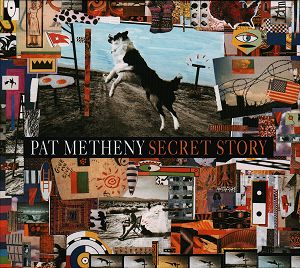1. Above the Treetops
2. Facing West
3. Cathedral in a Suitcase
4. Finding and Believing
5. The Longest Summer
6. Sunlight
7. Rain River
8. Always and Forever
9. See the World
10. As a Flower Blossoms (I Am Running To
You)
11. Antonia
12. The Truth Will Always Be
13. Tell Her You Saw Me
14. Not To Be Forgotten (Our Final
Hour)
Bonus CD
1. Back in Time
2. Understanding
3. A Change in Circumstance
4. Look Ahead
5. Et si c’était la fin (As If It Were
the End)
Pat
Metheny
– Electric guitars, acoustic guitar, synthesisers,
electric basses, keyboards, guitar synthesiser,
keyboard bass, electric percussion, electric
sitars, piano, electric piano, pikasso guitar,
synclavier, accordion
Members of the London Orchestra conducted
by Jeremy Lubbock
Charlie Haden – Acoustic bass (tracks 1, 8,
II/1)
Naná
Vasconcelos
- Percussion, vocals (tracks 1, 4, 5, 10,
11)
Armando
Marçal
– Percussion (tracks 1-8, II/4)
Lyle
Mays
– Acoustic piano, keyboards (tracks 2, 6,
II/4)
Steve Ferrone – Drums (tracks 3-5)
Mark Ledford – Vocals (tracks 3, 4, II/4)
Danny Gottlieb – Cymbal roll (tracks 3, 11)
Will Lee – Electric bass (tracks 4, 6, II/5)
Steve Rodby – Acoustic bass, electric bass
(tracks 4-7,9, 11, II/4)
Paul Wertico - Drums (tracks 4, 5, 7-9, 11,
II/4)
Gil Goldstein – Accordion (track 4), acoustic
piano (tracks 7, 9)
Sammy
Merendino
– Drums (track 6)
Andy Findon – Flute (track 7)
Toots Thielemans – Harmonica (tracks 8, 11,
II/1)
Michael
Mossman,
Mike Metheny, Ryan Kisor - Trumpets, flugelhorn
(track 9)
Tom Malone – Trombone (track 9)
Dave Taylor – Bass trombone (track 9)
Dave Bargeron – Trombone, tuba (track 9)
John Clark – French horn (track 9)
Anthony Jackson – Contrabass guitar (track 9)
Akiko Yano – Voice (track 10)
Skaila Kanga – Harp (tracks 13, II/2)
David Blamires – Voice (track II/4)
Paulo Braga – Drums (track II/5)
Members of the Quebec Children’s Choir (track
II/5)
This
reissued 1992 album has been praised and maligned
in almost equal measure. Many people have
praised its ambitious eclecticism and called
it "epic" and a milestone in Pat
Metheny’s career, while others have rejected
it as pompous and overblown. The "overblown"
accusation might seem justified from the extensive
personnel list above, which suggests that
Metheny threw in everything except the kitchen
sink. Undoubtedly it is an ambitious album
but we may say that Pat’s ambition has largely
been realised.
The
album was recorded before world music started
to be widely incorporated into jazz. In fact
Metheny’s vision encompasses a variety of
styles, including a Cambodian choir (strangely
not credited on the sleeve), members of a
symphony orchestra as well as Metheny’s regular
jazz group, and Pat himself playing a huge
range of different instruments. The richness
of the resources used is sometimes in danger
of swamping the music, creating what sounds
like a film soundtrack or even something blander.
Cathedral in a Suitcase sounds like
a piece of seventies’ pomp-rock, and its repetitive
bell-like sound soon gets on one’s nerves.
Yet Metheny’s vision survives because of the
obvious passion he put into every track, all
composed by Pat himself (with Akiko Yano added
as co-writer for As a Flower Blossoms).
Another positive aspect is that Metheny has
always stressed the melodic element in jazz
(despite his rather abrasive excursions with
Ornette Coleman), so this album is full of
glorious tunes to lift the heart.
Fans
of Pat Metheny’s normal group will find plenty
here to please them, with Lyle Mays’ keyboards
adding their special beauty to three tracks,
and Pat himself supplying Lyle Mays-type sounds
in several other places. As a bonus, this
reissue contains an extra CD of five tracks
not on the original album. They were probably
omitted from the original version for lack
of space, as the main CD lasts for more than
76 minutes. The bonus CD includes some poignant
harmonica from Toots Thielemans on Back
in Time, but it’s difficult to comment
on the other tracks as they seem to be listed
in the wrong order on the sleeve, so one can’t
be sure which is which! Track 2 is probably
Look Ahead, not Understanding,
and it captures the Metheny sound as we know
and love it: with swooping keyboards and ethereal
voices.
Surveying
the album as whole, one can understand the
criticisms without agreeing with them. Ultimately
one’s reaction to this album is likely to
be personal (how’s that for a truism?) but,
personally, I like it.
Tony
Augarde
